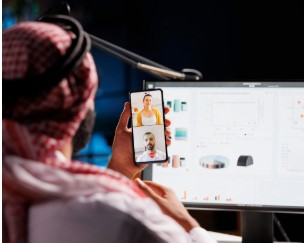The future of healthcare is being redefined by AI healthcare mobile apps development, where intelligent mobile applications are transforming how hospitals and doctors deliver care. From real-time patient monitoring to predictive analytics and personalized treatment, these AI-driven solutions are reshaping medical systems across the globe.
For hospitals and health systems preparing for the next wave of transformation, the nexus of Seattle-style innovation and Saudi Arabia’s sweeping healthcare reform offers unique possibilities. In this blog, we explore how to build AI-enabled mobile apps for Saudi Arabian hospitals that draw inspiration and technical strength from Seattle’s vibrant health-tech scene. We’ll cover the strengths of Seattle, the opportunities in Saudi Arabia, mobile app concepts, the challenges, and how choosing the right development partner—such as Hyena Information Technologies, a globally recognized mobile app development firm—can make all the difference.
Seattle’s Health-Tech Strengths
Seattle is widely recognised as a hotbed for digital health innovation, with advantages that extend far beyond its scenic surroundings.
Talent and infrastructure
- The presence of tech giants in and around Seattle, along with strong cloud, AI and machine-learning ecosystems, provides a deep talent pool for healthcare mobile solutions.
- Start-ups and mid-sized firms already operating in health and wellness prove that ideas can be translated into patient-facing products.
- The focus on platforms, data analytics, user-centric design and rapid iteration is matured in the Seattle market.
Diverse health-mobile case-studies
- Companies working on remote patient monitoring show how mobile + AI + wearables can become holistic platforms.
- Mental-health mobile apps and therapeutic gaming start-ups from Seattle demonstrate how user engagement matters.
- Data-analytics & visualisation firms sharpen the ability to convert raw data into actionable insights for hospitals.
By leveraging this environment, an app built for Saudi Arabia can benefit from proven patterns—well-crafted UX, scalable cloud back-ends, secure data flows, and AI models trained for real-world clinical contexts.
Saudi Arabia’s AI Healthcare Mobile Apps Market
Saudi Arabia stands at the cusp of a healthcare transformation. With ambitions rooted in its Vision 2030 framework, the Kingdom is actively embracing digital health innovation and AI-driven app development to modernize its hospitals and clinics.
A clear national strategy
- Under Vision 2030, the Health Sector Transformation Programme outlines how AI, telemedicine and digital health should support an upgraded healthcare system.
- Hospitals in Saudi Arabia are being asked to adopt modern tools and workflows, making them a fertile market for well-designed mobile apps.
Enabling infrastructure and investment
- The Kingdom boasts high internet penetration and government-backed digital health initiatives (e.g., widely used health apps).
- Large-scale investments are being made in AI, healthcare infrastructure, and innovation funds geared at health-tech deployment.
- Use-cases already in play: AI for early disease detection, national command-centres for chronic disease management (e.g., diabetes), real-time monitoring hubs.
Healthcare needs and market gaps
- High prevalence of chronic diseases (diabetes, cardiovascular conditions) means a strong demand for remote monitoring and patient-engagement mobile apps.
- Remote and rural areas benefit from mobile health apps that can bridge distance and access issues.
- Cultural, language and localisation needs mean mobile apps must be adapted for Saudi users rather than simply repurposed western apps.
All in all, Saudi Arabia presents a high-potential market for mobile apps that combine AI, real-time data, intelligent workflows and patient-centric design.
Potential Mobile App Concepts
Bringing Seattle’s innovation to Saudi hospitals means creating mobile apps tailored for local contexts—but leveraging global best practice.
AI-Powered Remote Patient Monitoring
- Design a mobile app that integrates with wearables, sensors and user input to continuously monitor chronic conditions such as diabetes or heart disease.
- Use AI algorithms to flag risk patterns, alert hospital staff or caregivers, and push personalised interventions.
- Example: Seattle companies have built remote patient monitoring platforms; we can adapt that expertise into mobile form for Saudi patients.
- Benefit: hospitals in Saudi Arabia can reduce readmissions, increase proactive care and improve outcomes in chronic disease hotspots.
Culturally-Tailored Mental Health App
- Mental health remains a sensitive topic in many cultures. An app designed for Saudi Arabia must be culturally sensitive, Arabic-language enabled, and respectful of local norms.
- Leverage Seattle-style mental-health mobile apps, chatbots and virtual therapy to create accessible, private, engaging support.
- Features: AI-powered symptom checkers, chat-based therapy, guided modules, offline support, emergency escalation.
- The value: mental-health care penetration can increase, stigma can be reduced, and hospital systems can integrate with mobile-first pathways.
Precision Medicine & Genetics App
- Saudi Arabia has a relatively high incidence of certain genetic disorders and is investing in precision health.
- Mobile apps that gather genetic data securely, deliver personalised treatment insights, and coordinate with hospital systems could be highly valuable.
- By importing Seattle’s strengths in genomics-AI and mobile front-ends, hospitals in Saudi Arabia can offer patient-facing apps for genetic risk, treatment planning and monitoring.
AI-Assisted Diagnostics and Triage
- Imagine a mobile app in a hospital setting where patients input symptoms, the AI engine does a first-pass triage, guides them to the right department or remote consultation.
- Seattle has seen development of AI-driven tele-health and symptom-checkers; applying that to Saudi Arabia allows hospitals to reduce burden, increase efficiency and improve access.
- Integration with hospital EMR and workflow makes this a powerful tool.
Key Challenges and Considerations
These opportunities are compelling—but successful execution requires addressing significant challenges.
Regulatory navigation
- In Saudi Arabia, mobile apps used in healthcare may be classified as medical devices or clinical decision support tools. The Saudi Food and Drug Authority (SFDA) has regulations around digital health and AI-based medical devices.
- Developers must ensure compliance with national data-privacy, cybersecurity and health-data laws under the Saudi Data & AI Authority (SDAIA).
- Early engagement with regulatory advisors, clear classification of the mobile system, and validated clinical evidence may be required.
Data localisation and governance
- Health data is highly sensitive. SDAIA and Saudi health-regulators may require data to reside in-country, restrict cross-border flows, or impose encryption and access controls.
- Mobile apps must be architected with this in mind: regional cloud deployments, data sovereignty, secure transport, robust consent management.
- Collaboration between Seattle software teams and Saudi IT infrastructure teams is critical.
Cultural adaptation and localisation
- An app must reflect language (Arabic), cultural norms (user privacy, patient-doctor relationships), patient workflows in Saudi hospitals. What works in Seattle may not translate directly.
- UI/UX design, onboarding flows, engagement models need to be customised for Saudi patient demographics, mobile-usage patterns, literacy levels.
- More than translation — behavioural insight, iconography, moderation of sensitive content (e.g., mental health) must be adapted.
Technology transfer and collaboration
- One of the aims of Vision 2030 is building local capacity in AI, health-tech and mobile innovation. A partnership should include knowledge transfer: training of Saudi developers, local AI model fine-tuning, joint ownership of IP and deployment.
- Seattle firms and Saudi hospital systems need to build long-term collaborative models (rather than simple outsourcing).
- A robust implementation plan includes local system integration (hospital IT, regional networks), pilot deployment, feedback loops, scalability planning.
Budget, timeline and complexity
- Mobile apps for hospital systems with AI, monitoring, data integration can be complex—expect 6–12 months (or more) for full roll-out depending on features, integration depth, regulatory clearance.
- Hospitals may need to invest not just in the app, but in sensors/wearables, mobile device management, training of staff, data-monitoring workflows.
- Clear budgeting, realistic phasing (pilot → scale), and stakeholder buy-in are essential.
Why Choose Hyena Information Technologies
In selecting a development partner for such a cross-regional mission, proven experience in mobile apps, AI, global markets and healthcare matters. That’s where Hyena Information Technologies stands out.
- Hyena positions itself as a global mobile app development company serving USA, Middle East, UK, India and worldwide.
- They highlight expertise in mobile app development (iOS, Android, cross-platform) plus AI, machine learning, IoT and big-data.
- Their services specifically mention healthcare/fitness mobile apps and engagements in global markets (India, USA, UAE, Kuwait).
- Their global presence and adaptability means they are well-positioned to build apps that span multiple regions, address localisation, regulatory and technical challenges.
When bringing Seattle innovation + Saudi hospitals together, you need a partner capable of: delivering high-quality mobile apps, integrating AI in healthcare contexts, supporting localisation (Middle East), navigating deployments across geographies—and Hyena ticks many of those boxes.
Roadmap: From Concept to Deployment
Here’s a suggested high-level roadmap for building the mobile app:
- Define the value proposition
- Identify which hospital need you’re addressing: chronic disease monitoring, mental health support, diagnostics triage, precision medicine.
- Engage Saudi hospital stakeholders (clinical leadership, IT, patients) to validate requirements, workflow, pain-points.
- Partner & team setup
- Engage Hyena Information Technologies (or similar) as your mobile app development and AI delivery partner.
- Form a joint team: Seattle/US architects (if using Seattle innovation patterns), local Saudi IT/hospital staff, Hyena developers.
- Define governance: roles, knowledge transfer, compliance, localisation support.
- Design & architecture
- Build UX/flow diagrams that reflect Saudi user context (language, cultural norms, hospital workflows).
- Define backend architecture: cloud vs on-premises, data localisation, AI-model hosting, mobile app front-end spanning iOS/Android.
- Choose AI/ML modules: remote monitoring algorithm, chatbot/virtual therapy engine, triage engine, precision-medicine module.
- Plan data integration: hospital EMR, sensors/wearables, monitoring dashboards, alerting systems.
- Prototype & pilot
- Build an MVP mobile app with core features, localisation for Saudi users, basic AI module.
- Pilot in a selected hospital / ward / patient cohort in Saudi Arabia. Gather user feedback, clinical validation, engage compliance/regulatory.
- Iteratively refine UI/UX, performance, data flows, AI fine-tuning.
- Regulatory & security validation
- Work with Saudi regulators (SFDA, SDAIA) for required approvals, certifications, data-governance audits.
- Perform security testing: mobile app penetration testing, backend API security, patient data encryption, access controls.
- Scale & deploy
- Expand from pilot to full hospital rollout (or multiple hospitals).
- Monitor performance, app usage, clinical outcomes, user satisfaction.
- Provide training for hospital users (clinicians, nursing staff, patients) and establish maintenance/support model.
- Support versioning, AI-model updates, localisation adjustments, support for Arabic/English, mobile OS updates.
- Measure & iterate
- Define KPIs: patient engagement rates, hospital readmission reductions, diagnostic accuracy improvement, cost savings.
- Use analytics to measure success, feed back into new features or improved AI models.
- Plan for continuous updates: regulatory changes, local hospital needs, evolving AI features.
Conclusion
Bridging Seattle’s health-tech innovation with Saudi Arabia’s ambitious healthcare transformation is an exciting endeavour. Mobile apps powered by AI can deliver new levels of care—remote monitoring, mental-health access, tailored treatment, faster diagnostics. But success isn’t guaranteed: it demands regulatory navigation, rigorous data governance, cultural adaptation and strong execution.
By working with a globally-experienced development partner like Hyena Information Technologies, and following a structured roadmap from concept to deployment, hospitals in Saudi Arabia can leverage the best of Seattle’s innovation and localise it for high impact. The result? Mobile healthcare apps that not only look good on the phone—but deliver outcomes, scale across regions, and become part of the future of care.
 WhatsApp Us Now
WhatsApp Us Now









